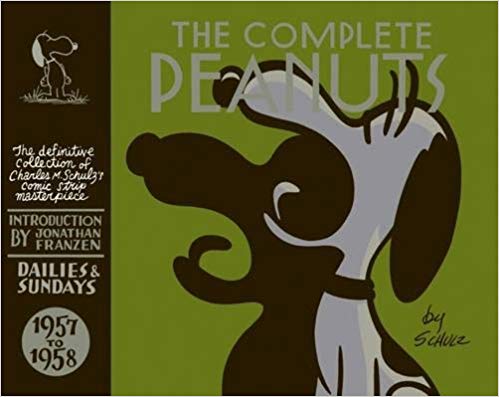
By Charles Schulz (Canongate Books/Fantagraphics Books)
ISBN: 978-1-84767-076-2 (Canongate) 978-1-56097-670-7 (Fantagraphics)
Peanuts is unequivocally the most important comics strip in the history of graphic narrative. It is also the most deeply personal.
Cartoonist Charles M Schulz crafted his moodily hilarious, hysterically introspective, shockingly philosophical epic for half a century. He published 17,897 strips from October 2nd 1950 to February 13th 2000 and died from the complications of cancer the day before his last strip was published…
At its height, the strip ran in 2,600 newspapers in 75 countries, translated into 21 languages. Many of those venues are still running perpetual reprints, as they have ever since his departure. Attendant book collections, a merchandising mountain and television spin-offs made the publicity-shy artist a billionaire.
None of that is really the point. Peanuts – a title Schulz loathed, and one the syndicate forced upon him – changed the way comics strips were received and perceived by showing that cartoon comedy could have edges and nuance as well as pratfalls and punchlines.
Following an incisive and analytical Foreword by Jonathan Franzen, exploring which characters most reflected the true “Sparky†Schulz and exploring the importance of the material in this hugely enticing tome, the endless days of play, peril and adroit psychoanalysis resume in unprepossessing monochrome…
Our focus (we just can’t call him “star†or “heroâ€) is everyman loser Charlie Brown who with increasingly high-maintenance, fanciful mutt Snoopy is increasingly at odds with a bombastic and mercurial supporting cast who are hanging out doing kid things and becoming unique comedic archetypes of their own.
The daily gags, as always, centre on playing, playing pranks, playing sports (such as archery, tennis, football, golf, baseball, swimming and croquet), playing musical instruments, teasing each other, making baffled observations and occasionally acting a bit too much like grown-ups. The ferocious unpredictability and wilfulness of seasonal weather begins taking on a malicious life of its own in these years…
Mean girl Violet, infant prodigy Schroeder, “world’s greatest fussbudget†Lucy, her strange baby brother Linus and dirt-magnet “Pig-Pen†all add signature twists to the mirth: each sufficiently fleshed out and personified to generate jokes and sequences around their own foibles.
Charlie Brown has settled into his existential angst and is resigned to his role as eternal loser: singled out by fate and the relentless diabolical wilfulness of Lucy who now sharpens her spiteful verve on everyone around her. Her preferred target is always the round-headed kid though: mocking his attempts to fly a kite, kicking away his football and perpetually reminding him face-to-face how rubbish he is…
The Sunday page debuted on January 6th 1952; a standard half-page slot offering more measured fare than the daily. Both thwarted ambition and explosive frustration became part of the strip’s signature denouements and these weekend wonders gave Sparky room to be at his most visually imaginative, whimsical and weird…
By this time, rapid-fire raucous slapstick gags were riding side-by-side with surreal, edgy, psychologically barbed introspection, crushing judgements and deep ruminations in a world where kids – and certain animals – were the only actors. The relationships are becoming increasingly deep, complex and absorbing…
Sheer exuberance and a spontaneous tendency to dance at any provocation also became a solid standby with the strips re-presented here. Particular moments to relish this time include Linus and Snoopy’s extended Cold War duel for possession of the cherished comfort blanket; the terrible burden of winter clothing; the overwhelming influence of television; Schroeder’s eternal love affair with Beethoven and cold disdain of Lucy’s far-from-apparent blandishments. A general trend sees all the kids evermore often beguiled by stargazing and waxing philosophical at the heavens’ splendour…
Surely coincidentally is some of the series’ signature expletives and epithets also premiering in these pages… you Blockhead!…
To wrap it all up, Gary Groth celebrates and deconstructs the man and his work in ‘Charles M. Schulz: 1922 to 2000’ whilst a copious ‘Index’ offers instant access to favourite scenes you’d like to see again….
Readily available in hardcover, paperback and digital editions, this volume offers a rare example of a masterpiece in motion: comedy gold and social glue metamorphosing into an epic of spellbinding graphic mastery that remains part of the fabric of billions of lives, and which continues to make new fans and devotees long after its maker’s passing.
The Complete Peanuts: 1957-1958 (volume 4) © 2005 Peanuts Worldwide, LLC. The Foreword is © 2005 Jonathan Franzen. “Charles M. Schulz: 1922 to 2000†© 2005 Gary Groth. All rights reserved.
